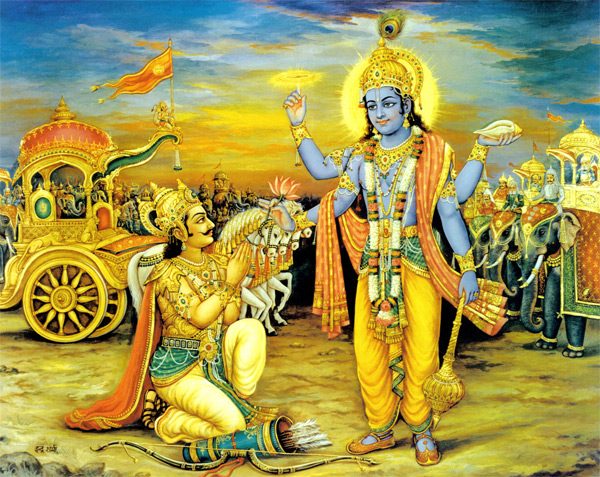– Dr. Shakuntala, Associate Professor, Department of Philosophy, University of Gauhati, Guwahati, Assam
Dr. Shakuntala did M.A. and Ph.D. from North-Easter-Hill-University, Shillong, Meghalaya. She has authored the following books – Enquiry into Nature of Self (2009), Essays on Philosophy of JidduKrishnamurti (2010), ‘What Ought I to Do?’ The Gita’s Perspective (2014), Rethinking Philosophy of JidduKrishnamurti (2015), and Revisiting the Upanisads (2016).
In the ethics of the Gita svabhava or one’s own nature plays a very important role. It holds that everyone, including the man of knowledge acts according to his own nature. It further says that one is compelled to act as prescribed by his nature and it is simply futile to try otherwise. Krishna tells Arjuna that it is pointless on the part of Arjuna’s to say that he would not fight for nature will certainly induce him to fight. ‘That which, through delusion, thou wishest not to do, O Son of Kunti (Arjuna), that thou shalt do even against thy will, fettered by thy own acts born of thy nature.’ (XVIII.60). Arjuna is born Kshatriya and thus there is no escape but to fight: ‘Even the man of knowledge acts in accordance with his own nature. Beings follow their mature. What can repression accomplish?’ (III.33) Gita says that the karma or action prescribed by one’s nature or svabhava is one’s duty or dharma. What one ought to do is prescribed by what one’s nature is. ‘Heroism, vigour, steadiness, resourcefulness, not fleeing even in a battle, generosity and leadership, these are the duties of a Kshatriya born of his nature.’ (XVIII.43). In fact, there is no good other than performing one’s duty as prescribed by one’s nature: ‘Having regard for thine own duty, thou shouldst not falter, there exists no greater good for a Kshatriya than a battle enjoined by duty.’ (II.31).
Now, if one indeed realizes the truth of such a situation, that one cannot escape doing what one’s nature forces one to do, one automatically becomes happy. When one acts according to one’s nature there is no conflict between what one is and what one thinks one ought to be. The ‘is’ is the ‘ought’. In other words, there is nothing one is putting up as ideal in such a situation to achieve. There is no gap between what one is and what one is trying to be- action becomes niskama, that is, action is performed without desire for becoming.

We further see that svadharma of the Gita as prescribed by one’s svabhava also dissolves the gap between individual and social duty. Arjuna by svabhava is a Kshatriya and thus is asked by Krishna to give up the thought of not-fighting and enter into the battle. But while performing his individual duty he also performs the social duty of a Kshatriya that demands from him generosity and lordly nature; demands that Arjuna does not get affected by personal preference while deciding an action that can change the fate of thousands of people. The Gita does not say that one is to perform two kinds of duties- individual and social. In the Gita in performing one’s individual duty one helps in smooth running of the society.
The Gita does not tire of saying that one cannot change the way nature behaves. Actually this has an important bearing on the whole issue of the ethics of Gita. On one hand we have seen that it helps one in performing action without desire, and on the other hand such a realization, the Gita shows, helps one in working out moral dilemmas. According to Gita the realization that one cannot change the way nature behaves automatically brings in detachment. When one truly understands the futility of trying to change course of nature, one in a way resigns to it. This attitude, the Gita shows, helps one in solving moral dilemmas of life. In the Gita, Arjuna is shown not questioning the rightness or wrongness of the action of going to battle. But Arjuna is shown as not wanting to enter into battle having seen his friends and family as his opponent: ‘When I see my own people arrayed and eager to fight O Krishna, my limbs quail, my mouth goes dry, my body shakes and my hair stands on end.’ (I.29). The question for Arjuna is not rightness or wrongness of action of doing battle but whether he would incur evil by killing the people who are his relatives: ‘And I see evil omens, O Kesava (Krishna), nor do I foresee any good by slaying my own people in the fight.’ (I.32). Krishna is reprimanding Arjuna for his behaviour that is borne out of attachment for his loved ones: ‘Thou grievest for those whom thou should not grieve for, and yet thou speakest words about wisdom.’ (II.11). If Arjuna were detached, he would not have been affected by who is standing against him but would have performed his duty: ‘As the unlearned act from attachment to their work, so should the learned also act, O Bharata (Arjuna), but without any attachment, with the desire to maintain the world-order.’ (III.25). Again, if Arjuna were detached he would have seen the fact that the battle would not stop with him not-fighting and in fact his not-fighting would affect the fate of all those people who agreed to enter into the battle and are fighting for the Pandavas in a negative way.
*The translation of the verses are taken from The Bhagavadgita by S. Radhakrishnan, HarperCollins India, Impression 2008.

Linking of ‘svadharma'(duty) with ‘svabhaav’ (nature/temperament) is certainly a most forward looking theory of education!!
LikeLiked by 1 person
such kind of article regarding Gita’s ethical perspective will provide us the knowledge of the hidden truth about the life. By going through it; we can understand niskama karma..n it says to do our duty according to our svabhava & svadharma.. nice article.
LikeLiked by 1 person